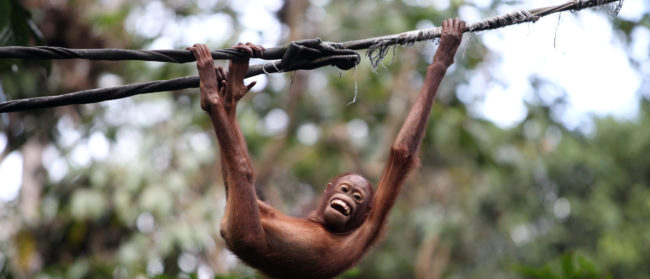Seven smiles, a green iridescent rainbow, and a pink background.
From faraway, the pastel-hued piece placed in the centre of an exhibition located in tranquil Bangkok garden in early September appeared cheerful. But upon closer inspection the murkier details became apparent, with the illustration showing a group of officials assaulting a student with guns emanating from their crotch and blood splattered on the student. The details raised questions – the police with a gunshot wound, the positioning of the characters, the unnerving smiles on their faces.
This is the work of provocative Thai artist Baphoboy, whose art touches on sexuality, violence, and politics in a satirical manner laced with dark humour. With striking compositions of authority figures, Baphoboy’s work is part of a wider conversation opening up among Thai youth, increasingly pushing the boundaries of public discourse.
“It started off as personal therapy. I couldn’t really move on from reading the news,” Baphoboy told the Globe. “I pondered on how to take action on these issues, such as politics and age hierarchy, that were inflicted upon me. How do we find a solution? I felt that I was able to draw and create images to reflect these issues. That’s why my set of work is quite political.”
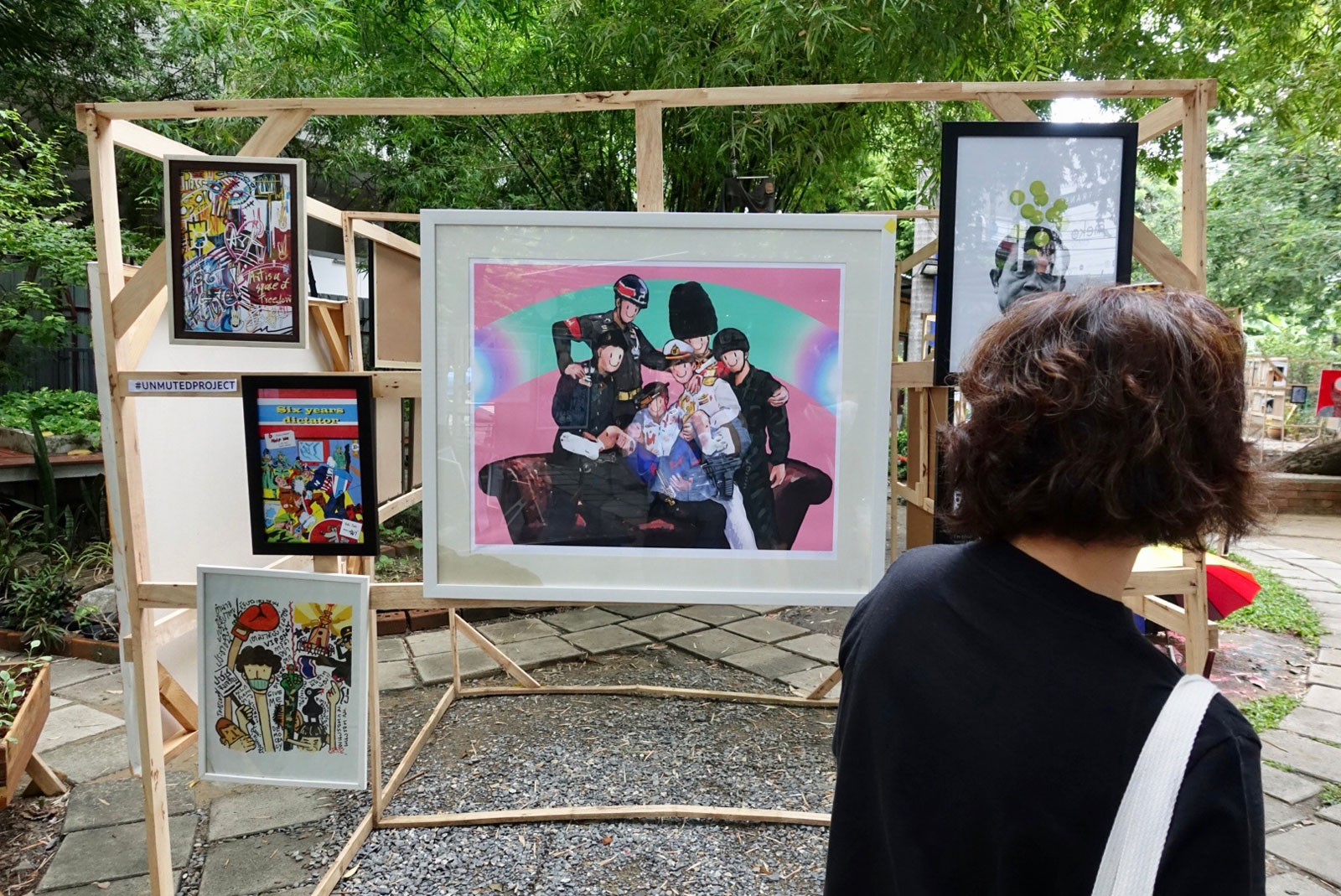
Each work comes from consuming news of that day, or from a couple of days ago, feeling frustrated, and then expressing it through the artwork
A recent graduate from Silapakorn University, Sippakorn “Ken” Khiaosanthia has been making art for around five to six years. But three years ago, he adopted the moniker Baphoboy and ventured onto social media platforms Instagram and Facebook, where he’s established a small but fast-growing following of almost 75k.
Earlier this month, his work was showcased in the #Unmuted Project exhibition, with over 100 artists showcasing pieces under the theme of ‘art that has disappeared under dictatorship’. Baphoboy’s work has drawn interest and gained popularity in recent months, with an increasing number of people voicing their concerns about the government, and elite rule generally in Thailand.
“Each work comes from consuming news of that day, or from a couple of days ago, feeling frustrated, and then expressing it through the artwork. That’s the inspiration behind the creation of each piece,” said Baphoboy.
Despite his bold approach to political themes, Baphoboy acknowledges that there are limitations to what topics are within the boundaries of Thai discourse.
“In reality, if we look at it from the perspective of boundaries in Thai society, there are always limitations. For example, the terms ‘sensitive’ or ‘superior’ indicate limitations,” he said.
Terms such as ‘superior’ are commonly used as euphemisms to refer to the monarchy, a taboo subject under Thailand’s strict lèse-majesté law. Looking abroad at “more developed regions”, Baphoboy notes that the word ‘sensitive’ does not exist in the same context and to the same extent, with greater freedom of expression that allows a more laissez-faire attitude towards political conversation.
Despite these societally imposed boundaries, and the severe consequences in Thailand that comes with pushing them too far, Baphoboy challenges himself to think of what is possible.
“The word ‘not appropriate’ or ‘beyond limit’ is simply an illusion,” he said. “When we create, we must not ask for the ceiling because the ceiling in art does not truly exist … We should be able to touch upon any subject and pose questions. Everything happens so that we can ask questions about them. It’s not the question of whether we should or should not discuss something. For me, making art does not have a limit.”
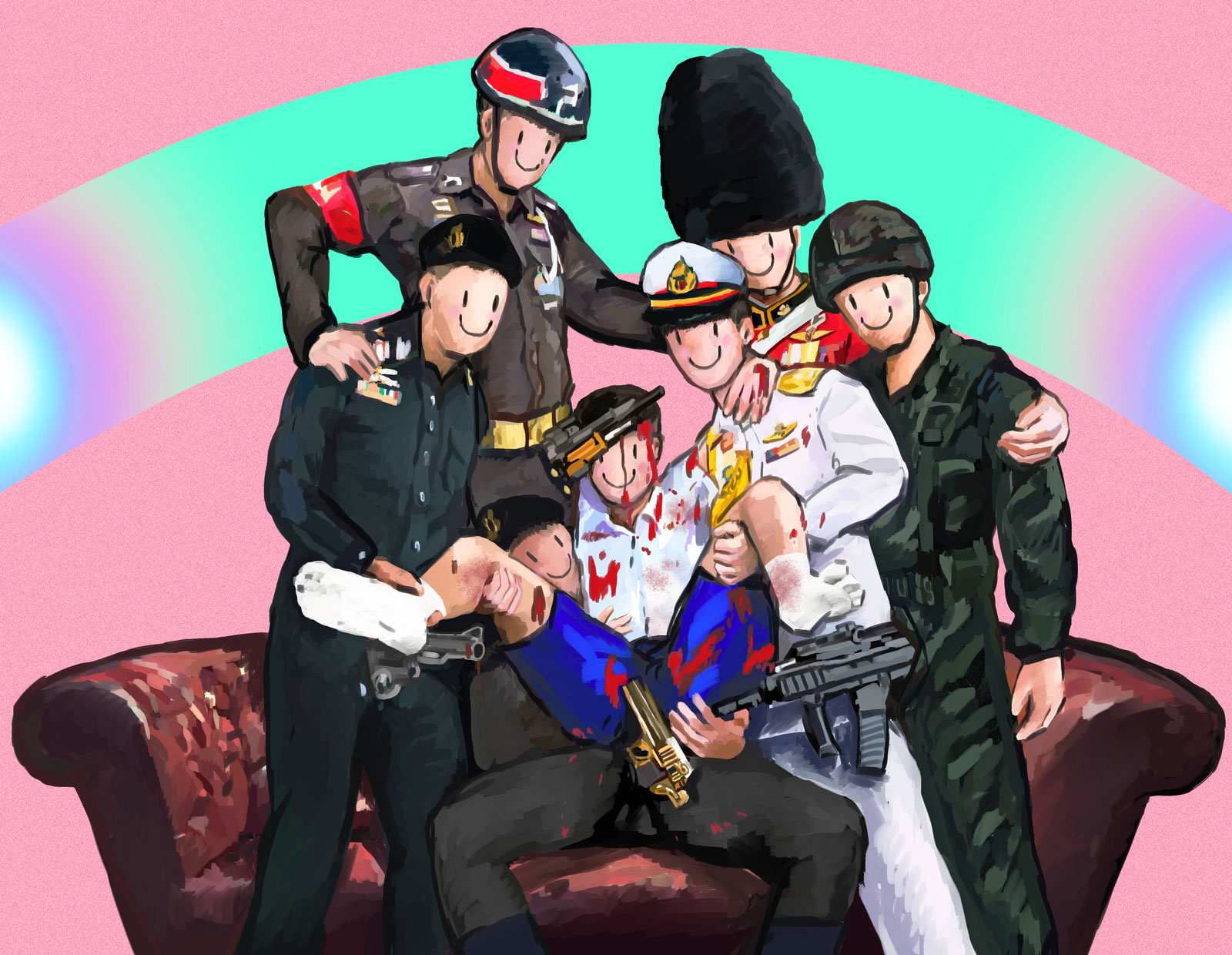
The graphic imagery of Baphoboy’s artwork, showing themes of abuse by authority figures. Illustrations: Supplied
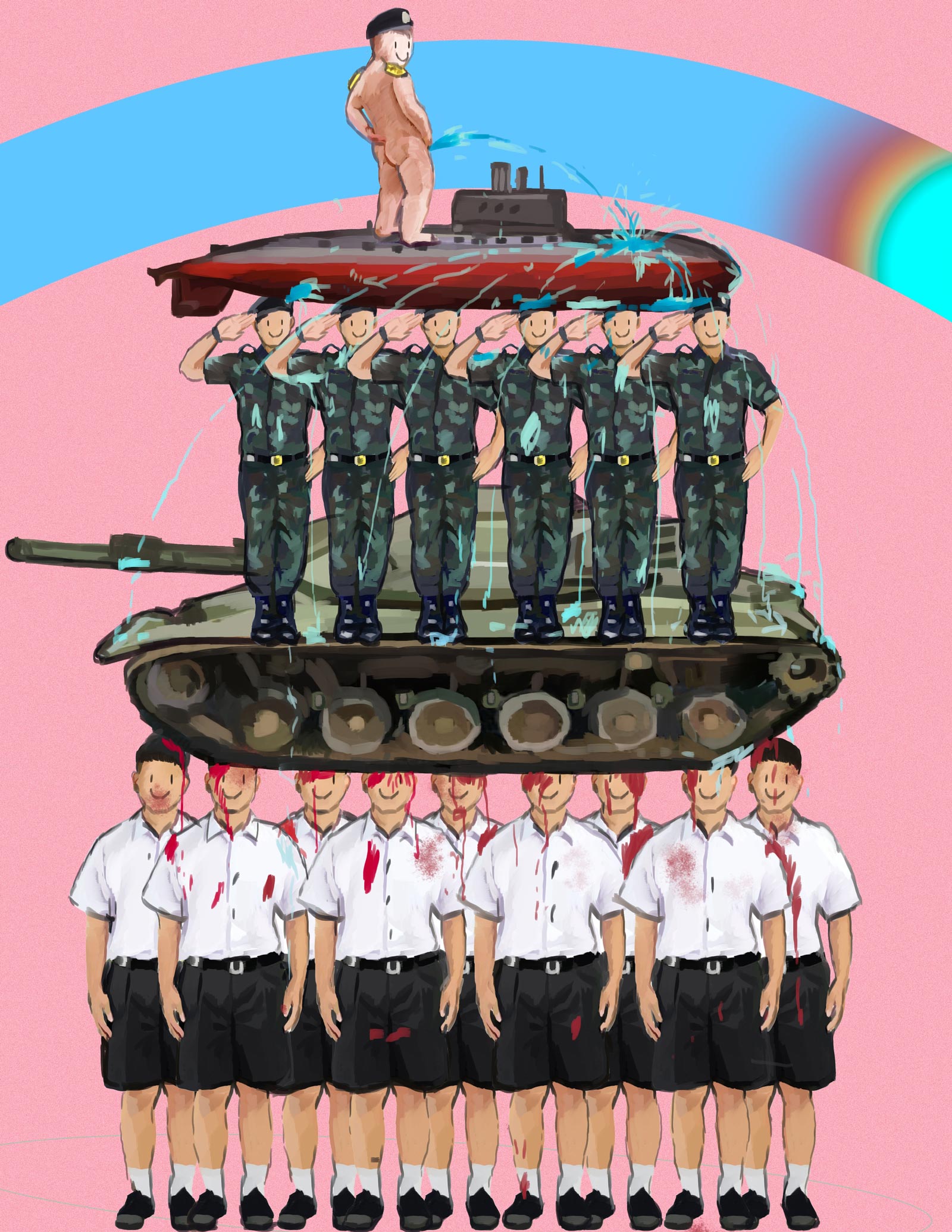
I will continue to work every day with the mindset that I am not afraid. Because the word ‘fear’ is a frame that limits the work to be created
Baphoboy constantly plays with themes that are sensitive in Thai society, such as sex and violence, using authority figures as protagonists in his work. In one piece, titled We love the people, the young artist depicts a military officer, police, king’s guard, soldier, and a bureaucrat harassing a student, with blank smiles, blood and guns. In another, titled Even if it floods, even if it rains, we still want to show our love, he depicts a group of ‘Jit Arsa’ royal volunteers with one volunteer holding up a three-finger salute sign.
Still, he leaves room for interpretation on the meaning behind the composition or the interaction portrayed in the artwork – a stylistic choice on Baphoboy’s part, as well as, perhaps, a sensible precautionary measure.
With the government crackdown on political dissidents on charges of sedition in recent months, speaking up about political issues can result in crackdowns by officials. When asked if a fear of backlash has had an impact on his art, Baphoboy responded that he chooses not to let fear play a role.
“I haven’t faced this myself, so I am able to speak about this topic with relative ease,” expressed Baphoboy. “But, if asked if I’m afraid, then probably not. Deep inside, everyone must be afraid because we all have our family and responsibilities. However, for me, I will continue to work every day with the mindset that I am not afraid. Because the word ‘fear’ is a frame that limits the work to be created.”
The name Baphoboy is a play on words with the Pagan god Baphomet, drawing similarities to the witch-hunt that Baphomet faced for having different opinions to mainstream beliefs. Since starting his art six years ago, the year of the 2014 military coup that ousted Yingluck Shinawatra and placed current prime minister Prayut Chan-o-cha at the helm, the boundaries of taboo topics have rapidly shifted in Thailand from Baphoboy’s perspective. Now, the political themes that drive Baphoboy’s work are being aired loudly in the current youth-led pro-democracy protests, calling for reform of the constitution and the monarchy.
“The word ‘sensitive’ at the end of last year and the word ‘sensitive’ today are very different. Last year, I was someone who was more daring than the average person. But today, I think I have become the average person because everyone has become more daring,” he said.
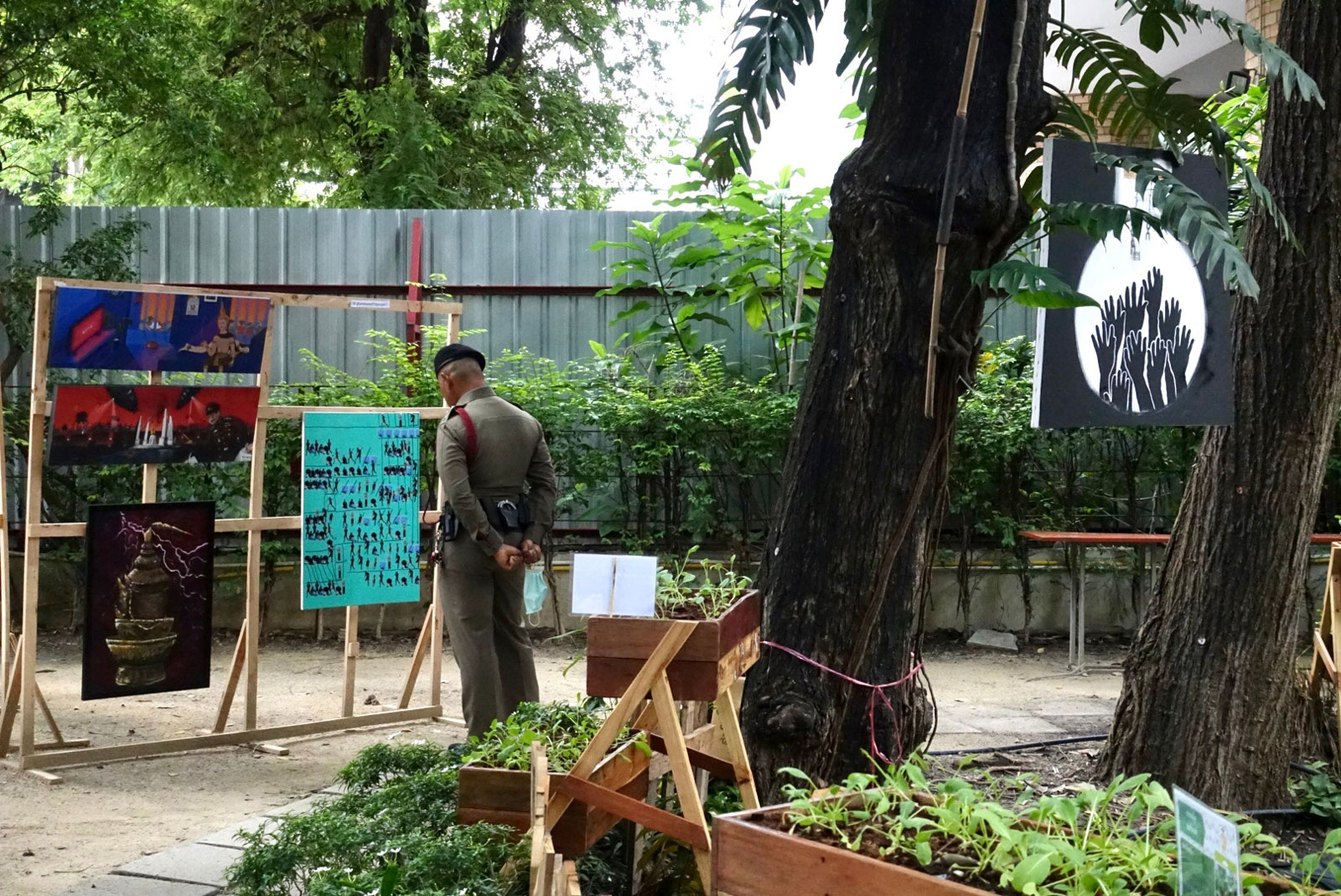
In recent months, there has been more open discussion of a once unspeakable topic, with political activists at demonstrations making public calls for reform of the monarchy – unprecedented developments in modern Thai history.
Somewhat unprecedented occurrences are also happening within the royal institution. Last week, King Maha Vajiralongkorn reinstated his royal consort Sineenat Wongvajirapakdi, after stripping her royal title and punishing her for “misbehaviour and disloyalty against the monarch” almost a year earlier. Sineenat is the first royal consort for almost a century in Thailand, with events unfolding inside the palace raising eyebrows among some sections of Thai society.
“I think these contexts change on the daily, whether that is because of news from the establishment itself or political news. It’s dependent on whether people still have faith or not,” said Baphoboy. “Next year, teenagers that have grown up might view that there is no longer anything that is ‘sensitive’ in Thailand. We are able to raise questions about Buddhism, about the monarchy – everything.”
Baphoboy sees his work as a small part of the current pro-democracy movement, mainly as a form of art and pop culture that can help to draw in a wider audience’s attention.
“For me, my work draws in people that might like visuals, making interpretations, ‘cool’ things, and fashion, to become interested in politics. It’s a channel to draw people’s attention,” he explained. “It’s a softer way to read and be interested in politics. For example, in comparison to sharing political news that is hate speech, sharing an image of an artwork is different.”
At the same time, Baphoboy sees that this pushing boundaries and connection to politics is essential for artists in Thailand.
“Art in Thailand still faces barriers, caught in holes and frames. I am one person that does not agree with the current situation and there are others who also do not agree,” he said. “Art supports politics. Politics also supports art as well. If politics was good, art would also be good. It goes hand in hand.”


